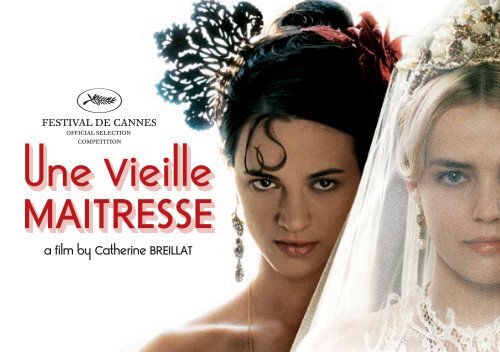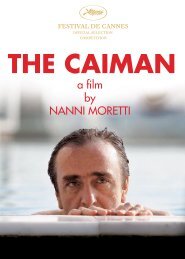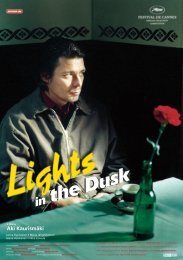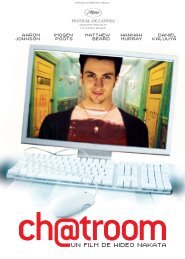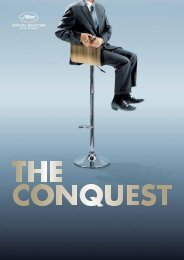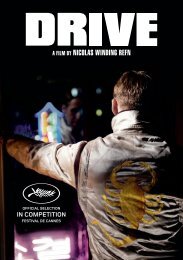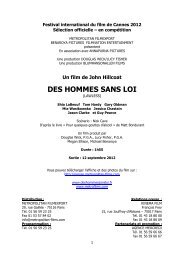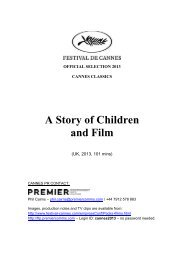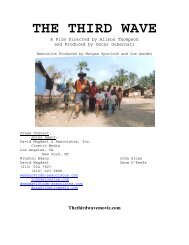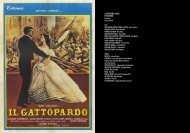a film by Catherine BREILLAT - Cannes International Film Festival
a film by Catherine BREILLAT - Cannes International Film Festival
a film by Catherine BREILLAT - Cannes International Film Festival
You also want an ePaper? Increase the reach of your titles
YUMPU automatically turns print PDFs into web optimized ePapers that Google loves.
a <strong>film</strong> <strong>by</strong> <strong>Catherine</strong> <strong>BREILLAT</strong>
WORLD SALES: PYRAMIDE INTERNATIONAL FOR FLASH FILMS<br />
IN PARIS:<br />
5, rue du Chevalier de Saint George<br />
75008 Paris France<br />
www.pyramide<strong>film</strong>s.com/pyramideinternational/<br />
Phone: +33 1 42 96 02 20<br />
Fax: +33 1 40 20 05 51<br />
vmerli@pyramide<strong>film</strong>s.com<br />
IN CANNES:<br />
<strong>Cannes</strong> Market Riviera - Booth : N10<br />
Phone: 04.92.99.33.25<br />
Contacts : Valentina Merli - Yoann Ubermulhin<br />
114 minutes<br />
French release date: 30th May 2007<br />
Download photos & press kit on www.studiocanal-distribution.com<br />
PRESSE: AS COMMUNICATION<br />
Alexandra Schamis, Sandra Cornevaux<br />
IN PARIS:<br />
11 bis rue Magellan 75008 Paris<br />
Phone: +33 (1) 47 23 00 02<br />
Fax: +33 (1) 47 23 00 01<br />
IN CANNES:<br />
Alexandra Schamis: +33 (0)6 07 37 10 30<br />
Sandra Cornevaux: +33 (0)6 20 41 49 55<br />
sandracornevaux@ascommunication.fr<br />
Jean-François Lepetit présents<br />
Asia Argento<br />
a <strong>film</strong> <strong>by</strong> <strong>Catherine</strong> <strong>BREILLAT</strong><br />
with<br />
Fu’ad Aït Aattou<br />
Roxane Mesquida<br />
Claude Sarraute<br />
Yolande Moreau<br />
Michael Lonsdale<br />
Screenplay: <strong>Catherine</strong> Breillat<br />
Adapted from the eponymous novel <strong>by</strong> Jules Barbey d’Aurevilly<br />
Produced <strong>by</strong> Jean-François Lepetit
The storyline<br />
This future wedding is on everyone’s lips. The young and dissolute Ryno de Marigny is<br />
betrothed to marry Hermangarde, an extremely virtuous gem of the French aristocracy.<br />
But some, who wish to prevent the union, despite the young couples’ mutual love, whisper<br />
that the young man will never break off his passionate love affair with Vellini, which has<br />
been going on for years.<br />
In a whirlpool of confidences, betrayals and secrets, facing conventions and destiny,<br />
feelings will prove their strength is invincible...
Interview<br />
with <strong>Catherine</strong> Breillat <strong>Film</strong> Director<br />
Photo: Guillaume LAVIT d’HAUTEFORT © Flach <strong>Film</strong>
The idea<br />
“When I first met producer Jean-François Lepetit, the idea<br />
of making a <strong>film</strong> based on UNE VIEILLE MAÎTRESSE - An old<br />
Mistress - had been on my mind for a long time. However,<br />
each time we met, I gave him scripts for other <strong>film</strong>s. Until<br />
ANATOMY OF HELL, which I have always considered as the<br />
end of a necessary cycle I had to finish before moving on to<br />
new pastures. And yet, as Jean-François says himself, without<br />
that <strong>film</strong>, I would never been able to make UNE VIEILLE<br />
MAÎTRESSE. There is a certain distance between them.”<br />
“I have always said that if I had been born in a different century,<br />
I would have been Jules Barbey d’Aurevilly, the author of the<br />
book I adapted to the screen. In his works, you have to look<br />
for the quintessence and hidden meanings which censure<br />
imposed, and forced him to tread a delicate path.”<br />
“Anémone, a famous French actress, introduced me to the<br />
book. She would have liked to play the role of Vellini. I enjoyed<br />
the dandyism, a last shout from the aristocracy. Just like<br />
the Marquise de Flers, I am absolutely “18th century”. The<br />
18th century was more elegant and open-minded than the<br />
19th, when the middle classes came into power, bringing<br />
narrow-mindedness and rigorously strict moral principles.<br />
The <strong>film</strong> contrasts these morals with the power of sentiments<br />
that transcend conventions. I also loved all these highly<br />
androgynous characters. Ryno is a terrible womaniser, a sort<br />
of Valmont (DANGEROUS LIAISONS), but he is also, like many<br />
dandies, deeply feminine. I’ve often dreamt about Michelangelo<br />
and the “Portrait of a Young Man” <strong>by</strong> Lorenzo Lotto (which is<br />
also in the <strong>film</strong>), about these men of dazzling beauty, a certain<br />
feminine beauty, yet without being effeminate.”<br />
“The story could only take place in an aristocratic environment.<br />
When struggling to survive, feeding a family and finding a<br />
roof for shelter, there is no time for the leisure of romance.<br />
Not enough time to experience the pureness. Sentiment can<br />
only be expressed in a certain level of comfort where it is<br />
not tainted <strong>by</strong> the harsh realities of life. The way many great<br />
authors of that era expressed strong feeling in such idealistic<br />
settings has always fascinated me. Aristocracy simply lends<br />
itself to the refinery of sentiments.”<br />
“Ten years ago, I underlined the important parts of the novel<br />
and dictated the basis of the scenario in four days. I did not<br />
want to adapt it; I wanted to make it mine. I took incredible<br />
liberties with the storyline. The script had obviously been<br />
ripening in my mind over the years, and I modified it again.”<br />
The general public<br />
“This is my most accessible <strong>film</strong> for the general public, and yet<br />
I did not betray myself. On the contrary to my usual <strong>film</strong>s, this<br />
one does not break any taboos. I had taken that style as far as it<br />
would stretch; it was time to come back to the essentials in life,<br />
pleasure, romance and passion. But romance is dark, which was<br />
another reason for wanting to make this <strong>film</strong>; for the romanticism,<br />
the burning passion, the terrible suffering, but without perverting<br />
the sentiments. The heart of the story portrays an ideal that<br />
topples into disaster as soon as it is reached.”<br />
“All my previous <strong>film</strong>s were judged nefarious or scandalous,<br />
but they did not represent the real me. I think this <strong>film</strong> really<br />
corresponds to my personality. I’m free at last. It represents the<br />
me that does not rise up against the world and its taboos. When<br />
I’m at peace, I’m actually terribly romantic.”<br />
“The Vicomte de Prony says that if ever Ryno de Marigny<br />
becomes a Minister, he would do his utmost to make himself<br />
unpopular. That’s what I’ve always done. Like all artists, I laid<br />
my foundations in opposition. And it’s a tough position, because<br />
when you realise just how much people can hate you for a <strong>film</strong>,<br />
a simple <strong>film</strong>, it’s pretty frightening. I’m not a terrorist, I don’t hurt<br />
anyone, all my actors like me and I’ve never betrayed them.”<br />
Cinema & paintings<br />
“Fiction is about recognising oneself behind the mask. We all<br />
live the same life, experience the same feelings. This is why
fiction is so essential to us, as it is in Art, because it serves that<br />
precise purpose. Making a <strong>film</strong> means creating prototypes for<br />
the spectators sitting in the dark who will identify completely<br />
with them. This time, I chose to make a romantic adaptation.”<br />
“<strong>Film</strong>s are not realism. The true sense comes over in a painting<br />
when the artist does not bother with reality. Reality is everywhere,<br />
on TV and in newspapers. But Art does not have to be realistic.<br />
<strong>Film</strong>s bring this over differently. Neorealism is a style, but not the<br />
realism that only makes pretty little <strong>film</strong>s. That’s the difference<br />
between a <strong>film</strong>maker and a maestro. The maestros have their<br />
own light, they do not need to know which lamp will throw light<br />
where, because their light shines from inside.”<br />
“I think of myself as a painter. I have always invented my own<br />
colours and chosen the pigments myself. And I was not going to<br />
start using acrylics just because I’d decided to paint a fresco!”<br />
“Paintings have often influenced the image and the tonality of<br />
my <strong>film</strong>s, like ROMANCE for example. To make that <strong>film</strong>, I turned<br />
to the Italians of Florence and Bergame, just like Lorenzo Lotto.<br />
I also adore many northern painters such as Holbein and Dürer,<br />
who also painted beautiful young, masculine men, but with lips<br />
and beautiful eyes like girls. I love this paradox.”<br />
The characters<br />
“What I really enjoy, is using literature as everyday language.<br />
The dialogues in this <strong>film</strong> are long and full of deep meanings,<br />
but only the emotion counts. I made complex sentences which<br />
were not meant to be recited, but expressed like unravelling<br />
thought. Actors have to be extremely concentrated to control<br />
these thoughts. They have to constantly convert the text into<br />
thought. But without us hearing the commas and full stops!<br />
This was, as in my other <strong>film</strong>s, one of the aspects that required<br />
attention.”<br />
Asia Argento<br />
“I met Asia ten years ago in Toronto. Despite her very young<br />
age, I could already imagine her in the role of La Vellini. She’s a<br />
character all of her own. And she was magnificent. Although it<br />
was quite a job tracking her down, once I found her again, she<br />
was as loyal as ever, even when shooting was delayed for a<br />
year because of my accident.”<br />
Fu’ad Aït Aattou<br />
“I was having lunch with my assistant and my production<br />
designer. At the end of the meal, Fu’ad came over to see me.<br />
I immediately knew he would be Ryno, if he could act. For the<br />
first time, I had found that dazzling beauty, feminine without<br />
being effeminate, that I’d always hoped to find. It was love at<br />
first sight; what I’d always dreamed of.”<br />
“His first attempts were not successful. Despite his beauty,<br />
he was not putting enough into it. Beautiful people cannot be<br />
forgiven! Exceptionally, I asked him to come back to try again,<br />
and this time he was incredible. It happened to be his birthday<br />
that day, 2nd November, which was also Barbey d’Aurevilly’s<br />
birthday!”<br />
“For his character, I wanted a clearness of the heart. I did not<br />
want anything like Merteuil (DANGEROUS LIAISONS). This story<br />
is about love and passion where the characters are pure. Real<br />
life is like Merteuil! With Fu’ad, as with all the other actors that<br />
I have come across, I feel I’m working with what I call “new<br />
born oxygen”. They have the pureness and energy of freshly<br />
discovered crystals. They were dedicated to the <strong>film</strong>. They wear<br />
my colours.”<br />
Roxane Mesquida<br />
“With Roxane it was also love at first sight. Following FAT GIRL!<br />
and SEX IS COMEDY, this is the third time we have worked<br />
together. I love her and I wish her staggering beauty and acting<br />
talents were more recognised. Roxane stood up to those who<br />
tried to make her say I’d manipulated and destroyed her. Her<br />
loyalty deeply moves me. She declares she truly became an<br />
actress during the love scene in FAT GIRL!, which was a act<br />
of bravery for such a young woman, and she came out of it<br />
radiant.”
Claude Sarraute<br />
“I first saw Claude in a French chat show. In my mind, the<br />
Marquise de Flers (Hermangarde’s mother), was like Louise de<br />
Vilmorin (French author 1902-1969) with her juvenile old lady<br />
with the twinkling eyes aspect. I gave her five pages to learn.<br />
She knew it off <strong>by</strong> heart. We are close friends today. I adore this<br />
distinguished intellectual who can, like me, say stupefying things<br />
with such freedom of thought without the slightest concern<br />
about what others might think. There is definitely something<br />
aristocratic about her. ”<br />
Yolande Moreau<br />
“I first noticed Yolande’s exceptional intelligence during one of<br />
the Cesar ceremonies (French Academy Awards). She has class<br />
and is sincerely generous. She immediately accepted the role.<br />
She is magnificent in it and comes over so differently from the<br />
Yolande we know... in one line, she had to say “Comme la mer<br />
monte” (the sea is rising); first of all, she thought is was a veiled<br />
reference to her own <strong>film</strong>, which has the same title, but in fact,<br />
the sentence came straight out of Barbey d’Aurevilly’s book,<br />
which I’d copied into the script!”<br />
Michael Lonsdale<br />
“I wanted English humour and elegance for the Vicomte de<br />
Prony’s character, which Michael Lonsdale has in a nutshell.<br />
I love the way that Michael sometimes uses words with<br />
incredible triviality with that high-pitched voice, full of irony<br />
and mischief.”<br />
“The <strong>film</strong> gave me the chance to work once again with<br />
Anne Parillaud, Lio and Amira Casar, who were kind enough<br />
to accept. Jean-Philippe Tessé (an influencial French <strong>film</strong><br />
magazine journalist) plays the role of the Comte de Mareuil. I<br />
spotted him while he was talking to his editor in the street one<br />
day. I chose him just like that, instinctively, the way I always<br />
do with actors.”
Shooting<br />
“Although I made no compromises, I know I would have made<br />
a different <strong>film</strong> if I had not had that stroke. I direct physically<br />
and I thought that it would be impossible on this <strong>film</strong>. But I was<br />
wrong. When making a <strong>film</strong>, you go towards the impossible,<br />
and the impossible happened once again! <strong>Film</strong> making is<br />
such a different state of mind, in which everything is possible,<br />
which is why I love it so much.”<br />
“Jean-François Lepetit did not make any compromises either.<br />
He is an extraordinary producer. No one else would have<br />
accepted to take on such a heavy <strong>film</strong> with such a handicapped<br />
director. The insurance companies refused to cover me.”<br />
“Shooting started exactly a year, day for day, after my<br />
accident. We started with the outdoor shots at Lalatte Fort,<br />
near Fréhel’ point, and on Bréhat Island, which was the most<br />
difficult logistically.”<br />
“The whole <strong>film</strong> took me eight months, which is pretty quick<br />
for a <strong>film</strong> of this scale. I always shoot very quickly and the<br />
quality of the actors helps me. I take long shots, which is rather<br />
risky, because if ever one of the actors looses concentration,<br />
we have to start all over again. On the other hand, when we<br />
obtain magnificent things, we already have 5 to 6 minutes in<br />
the box. I may be mad, or perhaps have a very traditional style,<br />
but I’m extremely strict in my work.”<br />
“UNE VIEILLE MAÎTRESSE is my dearest <strong>film</strong>. After all, it has<br />
cost as much as all the other ten put together! The only<br />
site where I could find the settings I wanted without going<br />
hundreds of miles away was on Bréhat Island – my island!<br />
Shooting was complicated; horses had to be taken over on<br />
barges, and a little train was needed to transport the <strong>film</strong><br />
crew. I found Vellini’s house on the coast there, at the end of<br />
Paon lighthouse pier. The moor is just behind the house I own<br />
on the island.”<br />
“For the costumes, as for the rest, I do not want to be a prisoner<br />
of realism, even if it is a period <strong>film</strong>. For Asia’s character, I<br />
imagined a femme fatale from the fifties with Rita Hayworth<br />
style revealing necklines instead of those that really existed<br />
in the days of Barbey d’Aurevilly. So I followed my fantasies.<br />
In my mind, the most beautiful Spanish woman of all times<br />
was the platinum blond (and German) Marlene Dietrich in THE<br />
DEVIL IS A WOMAN. We set off in the same direction.”<br />
“In addition to the actors’ work, all the jewellery, tiepins,<br />
costumes and lacework are authentic. They add to the <strong>film</strong>s<br />
climate. In spite of my lameness, I made it to the flee market<br />
to find the accessories I needed.”<br />
“My approach to the <strong>film</strong> set is also instinctive. For example, for<br />
the church scene, I decided to fulfil my dream and use Saint-<br />
Augustin for the door and Saint-Vincent for the great golden<br />
Christ inside. From the script, no one understood what we were<br />
shooting at Saint-Augustin and Saint-Vincent! But in the finished<br />
<strong>film</strong>, it has created a sort of ideal church in my eyes.”<br />
“In the same way, at the National Archives, I indicated Ryno’s<br />
stairway here, the bedroom there, and Tortoni’s arcades<br />
elsewhere. I had decided to turn this magnificent site into<br />
a sort of cinema city where we could shoot everything. The<br />
old gold shades and patina on the panelling was still intact<br />
making it a wonderful site. Everything was shot here; apart<br />
from the scenes shot at Lalatte Fort and the Hôtel de Beauvais,<br />
which had a half-circle facade I thought was vital. And I was<br />
impatient to get it! For La Vellini’s appartment, I simply went to<br />
the Schlumberger family’s town house in Rue Séguier, where<br />
my son’s grandmother lives.”
La Vellini<br />
<strong>by</strong> Asia Argento<br />
“I met <strong>Catherine</strong> Breillat in 2000 in Toronto where I was<br />
presenting my <strong>film</strong>, SCARLET DIVA. She told me about her<br />
idea then, but she made several other <strong>film</strong>s before getting<br />
round to it. In my opinion, <strong>Catherine</strong>’s <strong>film</strong>s are essential. I<br />
saw ROMANCE when I was writing a <strong>film</strong> that I myself thought<br />
would be impossible to make. But when I saw what she’d<br />
managed to do, I realised it was possible for a woman to<br />
approach sex freely. <strong>Catherine</strong>’s work has inspired me a lot<br />
and I will never forget the feelings I experienced thanks to her<br />
<strong>film</strong>. She gave me the courage. See FAT GIRL!, which is also<br />
one of my greatest cinema experiences, a unique <strong>film</strong>, truly<br />
exceptional, that I have seen many times.”<br />
“I love her <strong>film</strong>s and her way of thinking. I was intrigued to work<br />
with her. I had decided to be putty in her hands. Although I am<br />
a <strong>film</strong>maker myself, I only wanted to be an instrument for her<br />
to use. I hate people who complicate things or cannot stay in<br />
place. I put myself at her disposal for her story. When I accept<br />
to act for someone, I am a like a geisha ready for anything! I<br />
let myself be totally guided. Accepting to let yourself go is a<br />
really liberating experience.”<br />
“I also liked her idea because the subject is universal. It refers<br />
to ideal, instinctive love, a complete fantasy. To help me get<br />
into the character, <strong>Catherine</strong> advised me to see THE DEVIL IS<br />
A WOMAN <strong>by</strong> Josef von Sternberg, featuring Marlene Dietrich.<br />
La Vellini is an eternal woman. A fire burns within her that<br />
inflames all who approach her. She is a she-wolf. The real<br />
beauty of this woman lies in her difference. She has her own<br />
style. She loves passionately; she is not interested in passing<br />
fancies. She is uncompromising, possessive and sensual. The<br />
dialogues and fluctuations of the soul give this role something<br />
that takes it much further than it would have been possible in<br />
other eras. In fact, it is a very modern idea and I love identifying<br />
my own love affairs with it. La Vellini brought memories of<br />
passionate affairs, and some painful ones, back to me.”<br />
“One of <strong>Catherine</strong>’s strengths is giving herself no limits. In<br />
costume <strong>film</strong>s, I hate the way inspiration comes from still<br />
paintings, where there is no movement and everything is
constricted. <strong>Catherine</strong> managed to add life and passion to<br />
these sets and codes. <strong>Catherine</strong> had written and explained<br />
the character very well. She gives very precise indications<br />
about what she wants. I think that’s great. I would really like<br />
to conform to her point of view, her aesthetic sense and her<br />
personal vision of love.”<br />
“During the <strong>film</strong>, the language barrier was an obstacle. <strong>Catherine</strong><br />
has quite a structured way of thinking and sometimes I was<br />
worried about not understanding her. It was stressful. I have<br />
never worked so hard on my French! Usually, I don’t even look<br />
at my script until a couple of days before shooting, but this time<br />
I had five pages to read per day! I studied my lines. Sometimes<br />
I thought I’d understood her intentions, but realised I was wrong<br />
when it came to shooting and I had to change my approach.<br />
It was not easy. <strong>Catherine</strong> tends to <strong>film</strong> long sequence shots,<br />
which require remaining concentrated whilst the camera is all<br />
over the place!”<br />
“I was slightly anxious about the love scenes, but in fact, they<br />
were the easiest. I felt so free. The <strong>film</strong>ing was full of rich<br />
experiences. There were numerous violent emotions. I had to<br />
ride a horse, and I was afraid because my grandfather died<br />
from a horse-riding fall. On the set, there were moments when<br />
I felt something really special, unique, and I did things I had<br />
never done before, and expressed myself like never before.”<br />
“Peritonitis nearly killed me during shooting. We had to stop<br />
for two weeks. Everyone expected <strong>Catherine</strong> would be a<br />
problem after her stroke, but in fact it was me! I cannot explain<br />
what happened. I am never ill. There was something magic<br />
about it though. Everything I had kept inside during shooting,<br />
things I did not want to say, broke loose in my stomach. The<br />
experience changed my life. From this <strong>film</strong> I will treasure<br />
meeting <strong>Catherine</strong>, and a host of sentiments as contrasted<br />
and as passionate as those in the story. I’m really proud of<br />
this <strong>film</strong>.”
Ryno de Marigny<br />
<strong>by</strong> Fu’ad Aït Aattou<br />
“When I first met <strong>Catherine</strong> Breillat, I had only ever seen one<br />
of her <strong>film</strong>s, ROMANCE. Whether you like her <strong>film</strong>s or not, you<br />
cannot deny they are all full of genuine sincerity. That affects<br />
me and gives me the impression of understanding her world a<br />
little and makes me feel that there is a place for me there.”<br />
“Having the leading role in a big production <strong>film</strong> is pretty<br />
exciting. I do not think I will have the opportunity to play such<br />
high level and intense characters very often. Wherever my<br />
career takes me in the future, at least I have that experience.<br />
Ryno de Marigny is a wonderful role that made me feel I was<br />
telling my own story through my character. The plot brought<br />
back the memory of an important love story that took place<br />
a while ago that I had never told anyone about. The <strong>film</strong> gave<br />
me the opportunity to use and express the related emotions<br />
that were bottled up inside me.”<br />
“The further the costumes, hair styles and make-up are from<br />
the real me, the easier can I throw myself into the character.<br />
My personal aim is to feel at ease with myself in the role. And<br />
the less the role resembles me, the more can I throw myself<br />
into it. Although I cannot really explain why, I feel very close<br />
to Ryno. He can only really be himself and throw off the ropes<br />
of his society when he is with his old lover who has already<br />
freed herself from that. These rare moments of truth explain<br />
the strength of their relationship.”<br />
“Four months before shooting, I started rehearsing my lines.<br />
Mastering the language from another era was one of the<br />
difficulties of the <strong>film</strong>. At the time I lived in Lille (northern<br />
France) and I used to go out every evening and shout my lines<br />
on motorway parking areas to get familiar with each and every<br />
detail. I wanted to sound natural.”<br />
“I’ll never forget the first day on the set. We were in Brittany,<br />
in the courtyard at Lalatte Fort. There was an extraordinary<br />
atmosphere and the smell of wet soil. We wound up with the<br />
scene where Roxane arrives on horseback, crying, and I take<br />
her in my arms. Although my first lines were quite simple,
I was blocked. I just couldn’t get the words out in front of the<br />
camera. Luckily things got better after that.”<br />
“I put a lot of my true self into the character and then I let<br />
<strong>Catherine</strong> be my guide. Sometimes, I had prepared the scenes<br />
from a certain angle and she saw them from a completely<br />
different one. And each time, I noticed she was right. I trusted<br />
her entirely. I like the high standards she sets herself. I have<br />
always felt we had things to exchange. We are both convinced<br />
about what we have to do.”<br />
“In this <strong>film</strong>, I act with women practically all the time; Claude<br />
Sarraute, the Marquise, and Roxane, who plays my wife, were<br />
excellent partners, but most of my scenes were with Asia<br />
Argento. We got along fine; she really helped me a lot and<br />
always knew how to make me feel confident.”
Hermangarde<br />
<strong>by</strong> Roxane Mesquida<br />
“<strong>Catherine</strong> gave me the script without mentioning the role.<br />
Anyway, I love working with her so much that I would have<br />
accepted blindfolded. Plus the fact I really wanted to be in<br />
a costumes <strong>film</strong>; a childhood dream. I think that love stories<br />
were much better told in period <strong>film</strong>s than they are today.<br />
Our society, even if it pretends to be freer, does not deal with<br />
things quite so frankly as before. Although they had a more<br />
structured conduct and manners code than today’s, they were<br />
far blunter and to the point. Feelings were more genuine, more<br />
wholehearted. For actors, it is an opportunity to go further and<br />
take emotions to their limits.”<br />
“I was moved <strong>by</strong> my character Hermangarde, who is the sole<br />
victim. Her love for Ryno is pure. But her social status prevents<br />
her from expressing it, as if she were in shackles, and she<br />
remains cold and never sheds a tear in front of him. I could<br />
not break away from my character and I really felt her most<br />
vulnerable moments were when she was alone and could at<br />
long last cry. They were two very different states, one more<br />
formal and the other more instinctive. The contrast between<br />
the parts where Hermangarde maintains her rank and those<br />
where she subsides into pure emotion was impressive.”<br />
“On the first day, <strong>Catherine</strong> made us run around wearing our<br />
costumes so we could forget them and get used to them.<br />
My first scene was in the horse-drawn carriage, when I say<br />
good<strong>by</strong>e to my grandmother. All of a sudden, I really felt the<br />
difficulty of using period language naturally. I was so stressed<br />
out that I stuttered over each syllable. A right catastrophe!<br />
<strong>Catherine</strong> managed to get me over it <strong>by</strong> joking about it.”<br />
“This was my third <strong>film</strong> with her and I’m more than satisfied.<br />
She enjoys saying it’s the third time I’ve lost my virginity<br />
in her <strong>film</strong>s! I can see she is evolving. Even if her accident<br />
has modified her way of functioning, she still does not miss<br />
a detail. Paradoxically, her accident has changed her, she is<br />
more peaceful. I owe her everything. Thanks to her, I now<br />
know why I love this job. At the age of thirteen, I was in a <strong>film</strong><br />
without understanding what was going on.”
“But I felt so wonderful that I really wanted to carry on. I love<br />
acting. When I met her, she showed me how far emotions<br />
could be taken. And that has become my own aim now. The<br />
tougher it is, the further it goes, the more I want to act it.<br />
<strong>Catherine</strong> knows the exact level of my potential, she knows<br />
precisely what she can get out of me and each time I feel like<br />
I’m exploring new things.”<br />
“With <strong>Catherine</strong>, I don’t need to think, I let myself go completely<br />
and it is only when talking about the <strong>film</strong> later that I take stock<br />
of everything I’ve done and felt.”<br />
“Whether alone in a scene or with another actor, I always lean<br />
on <strong>Catherine</strong>. She knows how to get us into the right frame of<br />
mind, although I do not quite understand how! For example,<br />
for the lighthouse scene when I’m on the verge of fainting, she<br />
made me go up and down the stairs several times until I really<br />
felt I was about to faint! I think she is the only director who<br />
works like that. That helps me to discover my own emotions,<br />
at the risk of being overwhelmed. But it feels so good! I trust<br />
her so much that I simply follow her instructions, because I<br />
know she won’t let me down. I am putty in her hands; she can<br />
do whatever she likes with me.”<br />
“As far as I’m concerned, it was sheer pleasure all the time,<br />
every second of it. I counted the days because I did not want<br />
it to come to an end. I loved <strong>film</strong>ing the scene where, in tears,<br />
I gallop up riding side saddle and beg Ryno not to abandon<br />
me, stopping just in front of the camera. It was quite hard<br />
because I’d never ridden before. I had to come to a stop in<br />
tears and control the horse at the same time, and keep the<br />
intense emotion flowing. The more things appear difficult and<br />
hopeless, the more I enjoy doing them. In the morning, I love<br />
telling myself that I’m never going to make it.”
La marquise de Flers<br />
<strong>by</strong> Claude Sarraute<br />
“When I heard that <strong>Catherine</strong> Breillat wanted me in her latest<br />
<strong>film</strong>, I simply didn’t believe it. My only acting experiences<br />
dated back to my youth, and even then, I had an odd way of<br />
acting, which in fact earned me a few performances, because<br />
being out of step was fashionable at the time! Then I became<br />
a critic for Le Monde for the next forty years and never set foot<br />
backstage or on a set because I wanted to keep my spectator’s<br />
seat in order to remain neutral.”<br />
“In my mother’s ultra snob circle of friends, <strong>Catherine</strong> Breillat<br />
has always been recognised as a <strong>film</strong>maker of the utmost<br />
interest. Though my tastes are more popular and unprejudiced,<br />
they did not prevent me from admiring her work, which is<br />
always audacious and full of raw emotion. Her <strong>film</strong>s are worth<br />
far much more than the simplistic clichés that those, who more<br />
than often haven’t even seen the <strong>film</strong>s, like to stick on them!”<br />
“When I met her, I was attracted to her intelligence and her<br />
subtlety, but above all, I was moved <strong>by</strong> her sensitivity and her<br />
fragility. It is fascinating to see how much this woman links<br />
so much energy to the little bird fallen out of the nest attitude.<br />
I asked to be tested and she gave me a long scene to learn,<br />
which I acted out at her house. I was very pleased with the<br />
experience and sincerely thought nothing else would come<br />
of it! But a few days later, I got a call confirming my role as<br />
the Marquise de Flers! I was more than enthusiastic! I was a<br />
debutant actress at the age of nearly 80!”<br />
“The Marquise is a complex character. She is rich, powerful,<br />
which was quite rare for a woman of her time, but it is her<br />
experience that characterises her best: she has already<br />
lived; she knows what life is all about. When her beautiful<br />
granddaughter, the gem of her line, falls in love with the<br />
dissolute Ryno, she is distrustful, but she lets the young man<br />
charm her. Beyond conventions and the right-thinking coldsidedness,<br />
the Marquise remembers her own passions and<br />
loves that may have caused her pain, but which she could do<br />
nothing about. That’s something which moves me.”<br />
“I will remember the shooting period for a long time. It was<br />
a difficult moment in my personal life, because my husband,<br />
Jean-François Revel, was dying. Between visits to the<br />
hospital, I concentrated on what <strong>Catherine</strong> wanted me to do.<br />
The introduction to the <strong>film</strong> industry delighted me and helped<br />
me. I went through all that with a mixture of intense emotions,<br />
and I’ll never forget <strong>Catherine</strong>’s exceptional energy and her<br />
remarkable sensitivity.”
Asia Argento<br />
La Vellini<br />
<strong>Film</strong>ography actress<br />
2007 GO GO TALES <strong>by</strong> Abel Ferrara<br />
DISENGAGEMENT (DÉSENGAGEMENT) <strong>by</strong> Amos Gitaï<br />
2006 UNE VIEILLE MAÎTRESSE <strong>by</strong> <strong>Catherine</strong> Breillat<br />
THE THIRD MOTHER (LA TERZA MADRE) <strong>by</strong> Dario Argento<br />
BOARDING GATE <strong>by</strong> Olivier Assayas<br />
2005 TRANSYLVANIA <strong>by</strong> Tony Gatlif<br />
2002 XXX <strong>by</strong> Rob Cohen<br />
B. MONKEY <strong>by</strong> Michael Radford<br />
RED SIREN (LA SIRÈNE ROUGE) <strong>by</strong> Olivier Megaton<br />
2001 LES MORSURES DE L’AUBE <strong>by</strong> Antoine De Caunes<br />
1999 NEW ROSE HOTEL <strong>by</strong> Abel Ferrara<br />
THE PHANTOM OF THE OPERA <strong>by</strong> Dario Argento<br />
1996 THE STENDHAL SYNDROME (LE SYNDROME DE STENDHAL) <strong>by</strong> Dario Argento<br />
1994 QUEEN MARGOT (LA REINE MARGOT) <strong>by</strong> Patrice Chéreau<br />
1993 TRAUMA <strong>by</strong> Dario Argento<br />
1989 RED WOOD PIGEON (PALOMBELLA ROSSA) <strong>by</strong> Nanni Moretti<br />
SANCTUAIRE <strong>by</strong> Michele Soavi<br />
Actress - Director<br />
2004 THE HEART IS DECEITFUL ABOVE ALL THINGS<br />
(LE LIVRE DE JÉRÉMIE)<br />
2000 SCARLET DIVA
Fu’ad Aït Aattou<br />
Ryno de Marigny<br />
<strong>Film</strong>ography actor<br />
2006 UNE VIEILLE MAÎTRESSE <strong>by</strong> <strong>Catherine</strong> Breillat
Roxane Mesquida<br />
Hermangarde<br />
<strong>Film</strong>ography actress<br />
2006 UNE VIEILLE MAÎTRESSE <strong>by</strong> <strong>Catherine</strong> Breillat<br />
SHEITAN <strong>by</strong> Kim Chapiron<br />
2005 LE GRAND VOYAGE <strong>by</strong> Ismaël Ferroukhi<br />
2002 SEX IS COMEDY <strong>by</strong> <strong>Catherine</strong> Breillat<br />
SEXES TRES OPPOSÉS <strong>by</strong> Éric Assous<br />
2001 FAT GIRL! (À MA SOEUR!) <strong>by</strong> <strong>Catherine</strong> Breillat<br />
2000 GAIA <strong>by</strong> Olivier de Plas (medium-length <strong>film</strong>)<br />
1998 THE SCHOOL OF FLESH (L’ÉCOLE DE LA CHAIR) <strong>by</strong> Benoît Jacquot<br />
1997 MARIE BAIE DES ANGES <strong>by</strong> Manuel Pradal<br />
Television<br />
2006 MENTIR UN PEU <strong>by</strong> Agnès Obadia<br />
2005 LES VAGUES <strong>by</strong> Frederic Charpentier<br />
2003 LES PARADIS DE LAURA <strong>by</strong> Olivier Panchot
Claude Sarraute<br />
La marquise de Flers<br />
<strong>Film</strong>ography<br />
2006 UNE VIEILLE MAÎTRESSE <strong>by</strong> <strong>Catherine</strong> Breillat<br />
Theatre<br />
2002 LA PRESSE EST UNANIME<br />
Actress (1949-1952)<br />
Journalist, columnist and contributor<br />
“On va s’gêner” radio show on Europe 1 since 1999 - Columnist<br />
“On a tout essayé” TV show on France 2 since 2000 - Columnist<br />
Columnist at France Inter (1995-1999)<br />
Journalist for Le Monde (1953-1996)<br />
Journalist for the Sunday Express Parisian office (1954)<br />
Author<br />
2005 Belle, belle, belle<br />
2003 Dis voir, Maminette<br />
2000 Dis, est-ce que tu m’aimes ?<br />
1998 C’est pas bientôt fini !<br />
1996 Des hommes en général<br />
et des femmes en particulier<br />
1995 Papa qui ?<br />
1993 Ah ! L’amour, toujours l’amour<br />
1991 Mademoiselle, s’il vous plaît !<br />
1989 Maman coq<br />
1987 Allô ! Lolotte, c’est Coco<br />
1985 Dites donc
Yolande Moreau<br />
The comtesse d’Artelles<br />
<strong>Film</strong>ography actress<br />
2006 UNE VIEILLE MAÎTRESSE <strong>by</strong> <strong>Catherine</strong> Breillat<br />
LES SAPINS BLEUS <strong>by</strong> Romuald Beugnon<br />
2005 LOCKED OUT (ENFERMÉS DEHORS) <strong>by</strong> Albert Dupontel<br />
KING-KONG PARADISE <strong>by</strong> Stefan Liberski<br />
AU CRÉPUSCULE DES TEMPS <strong>by</strong> Sarah Lévy<br />
PARIS, I LOVE YOU (PARIS, JE T’AIME) <strong>by</strong> Sylvain Chomet<br />
CALL ME ELISABETH (JE M’APPELLE ELIZABETH) <strong>by</strong> Jean-Pierre Améris<br />
2004 ZE FILM <strong>by</strong> Guy Jacques<br />
THE AX (LE COUPERET) <strong>by</strong> Costa-Gavras<br />
2003 WHEN THE SEA RISES (QUAND LA MER MONTE) <strong>by</strong> Yolande Moreau, Gilles Porte<br />
French Academy Awards 2005, Best Actress (César)<br />
2002 BODY TO BODY (CORPS À CORPS) <strong>by</strong> François Hanss<br />
WELCOME TO THE ROSES (BIENVENUE CHEZ LES ROZES) <strong>by</strong> Francis Palluau<br />
2001 A PIECE OF SKY (UNE PART DU CIEL) <strong>by</strong> Bénédicte Liénard<br />
STEP BY STEP (UN HONNÊTE COMMERÇANT) <strong>by</strong> Philippe Blasband<br />
2000 AMELIE FROM MONTMARTRE<br />
(LE FABULEUX DESTIN D’AMÉLIE POULAIN) <strong>by</strong> Jean-Pierre Jeunet<br />
THE MILK OF HUMAN KINDNESS<br />
(LE LAIT DE LA TENDRESSE HUMAINE) <strong>by</strong> Dominique Cabrera<br />
1998 LE VOYAGE À PARIS <strong>by</strong> Marc-Henri Dufresne<br />
L’AMI DU JARDIN <strong>by</strong> Jean-Louis Bouchaud<br />
1997 LET THERE BE LIGHT (QUE LA LUMIÈRE SOIT!) <strong>by</strong> Arthur Joffé<br />
VOLLMOND <strong>by</strong> Fredi M. Murer<br />
MERCI MON CHIEN <strong>by</strong> Philippe Galland<br />
1996 TOUT DOIT DISPARAÎTRE <strong>by</strong> Philippe Muyl<br />
AN AIR SO PURE (UN AIR SI PUR) <strong>by</strong> Yves Angelo<br />
1995 THE THREE BROTHERS (LES TROIS FRÈRES) <strong>by</strong> Didier Bourdon & Bernard Campan<br />
HAPPINESS IS IN THE FIELD (LE BONHEUR EST DANS LE PRÉ) <strong>by</strong> Étienne Chatiliez<br />
LA BELLE VERTE <strong>by</strong> Coline Serreau<br />
1994 THE HORSEMAN ON THE ROOF (LE HUSSARD SUR LE TOIT) <strong>by</strong> Jean-Paul Rappeneau<br />
1992 GERMINAL <strong>by</strong> Claude Berri<br />
MY WIFE’S GIRLFRIENDS (LES AMIES DE MA FEMME) <strong>by</strong> Didier Van Cauwelaert<br />
LOONIES AT LARGE (LA CAVALE DES FOUS) <strong>by</strong> Marco Pico<br />
THE SON OF THE SHARK (LE FILS DU REQUIN) <strong>by</strong> Agnès Merlet<br />
1988 LE JOUR DE CONGÉ <strong>by</strong> Carole Laganiere<br />
1985 VAGABOND (SANS TOIT NI LOI) <strong>by</strong> Agnès Varda<br />
1984 VIVEMENT CE SOIR <strong>by</strong> Patrick Van Antwerpen
Writer-director<br />
2001 WHEN THE SEA RISES (QUAND LA MER MONTE) Cowritten with Gilles Porte<br />
The Louis Delluc first work prize 2004<br />
French Academy Awards 2005, Best First Feature <strong>Film</strong> (César)<br />
Theatre<br />
1999-2000 LES PENSIONNAIRES <strong>by</strong> Jérôme Deschamps & Macha Makeieff<br />
LES PRÉCIEUSES RIDICULES <strong>by</strong> Jérôme Deschamps & Macha Makeieff<br />
1996 LE DÉFILÉ <strong>by</strong> Jérôme Deschamps & Macha Makeieff<br />
C’EST MAGNIFIQUE <strong>by</strong> Jérôme Deschamps & Macha Makeieff<br />
LES BRIGANDS <strong>by</strong> Jérôme Deschamps & Macha Makeieff<br />
1990-93 LES PIEDS DANS L’EAU <strong>by</strong> Jérôme Deschamps & Macha Makeieff<br />
1989-93 LAPIN CHASSEUR <strong>by</strong> Jérôme Deschamps & Macha Makeieff<br />
1988 BRITANNICUS <strong>by</strong> H.Rolland<br />
1986 SOUS-SOL <strong>by</strong> A. Boiseau<br />
1985-86 SALE AFFAIRE, DU SEXE ET DU CRIME <strong>by</strong> Yolande Moreau<br />
Television<br />
2005 LE CRI <strong>by</strong> Hervé Baslé<br />
2003 LA VIE EST SI COURTE <strong>by</strong> Hervé Baslé<br />
2001 LE CHAMP DOLENT <strong>by</strong> Hervé Baslé<br />
2000 SA MÈRE LA PUTE <strong>by</strong> Brigitte Roüan<br />
1998 LE CHOIX D’UNE MÈRE <strong>by</strong> Jacques Malaterre<br />
1995 BALOCHE <strong>by</strong> Dominique Baron<br />
LE CHEVAL VOLÉ <strong>by</strong> Charlotte Brandstrom<br />
1994 LES DESCHIENS (Nulle Part Ailleurs) CANAL +<br />
ARTHUR RIMBAUD <strong>by</strong> Marc Rivière<br />
L’AVOCATE <strong>by</strong> Michel Wyn & Philippe Lefebvre<br />
LES VACANCES DE MAIGRET <strong>by</strong> Pierre Joassin<br />
1993 LA LETTRE INACHEVÉE <strong>by</strong> Chantal Picault<br />
1992 LES COMPAGNONS DE L’AVENTURE <strong>by</strong> Jean-Claude Arié<br />
1991 NAVARRO <strong>by</strong> Gérard Marx
Michael Lonsdale<br />
The Vicomte de Prony<br />
<strong>Film</strong>ography actor<br />
2006 UNE VIEILLE MAÎTRESSE <strong>by</strong> <strong>Catherine</strong> Breillat<br />
LA QUESTION HUMAINE <strong>by</strong> Nicolas Klotz<br />
GOYA’S GHOSTS (LES FANTÔMES DE GOYA) <strong>by</strong> Milos Forman<br />
2005 MUNICH <strong>by</strong> Steven Spielberg<br />
ONCE UPON A TOMORROW (IL SERA UNE FOIS) <strong>by</strong> Sandrine Veysset<br />
2004 GOOD GIRL (GENTILLE) <strong>by</strong> Sophie Fillières<br />
JEANNE À PETITS PAS <strong>by</strong> Nagar Djavadi<br />
LES INVISIBLES <strong>by</strong> Thierry Jousse<br />
LE PARFUM DE LA DAME EN NOIR <strong>by</strong> Bruno Podalydès<br />
2003 BYE BYE BLACKBIRD <strong>by</strong> Robinson Savary<br />
STRANGE CRIME (LE PRIX DU DÉSIR) <strong>by</strong> Roberto Andò<br />
5X2 <strong>by</strong> François Ozon<br />
LE FURET <strong>by</strong> Jean-Pierre Mocky<br />
2002 THE MYSTERY OF THE YELLOW ROOM<br />
(LE MYSTÈRE DE LA CHAMBRE JAUNE) <strong>by</strong> Bruno Podalydès<br />
1999 THOSE FACING US (CEUX D’EN FACE) <strong>by</strong> Jean-Daniel Pollet<br />
ACTORS (LES ACTEURS) <strong>by</strong> Bertrand Blier<br />
1998 RONIN <strong>by</strong> John Frankenheimer<br />
DON JUAN <strong>by</strong> Jacques Weber<br />
1997 LET THERE BE LIGHT (QUE LA LUMIÈRE SOIT!) <strong>by</strong> Arthur Joffé<br />
1994 NELLY AND MR ARNAUD<br />
(NELLY ET MONSIEUR ARNAUD) <strong>by</strong> Claude Sautet<br />
JEFFERSON IN PARIS <strong>by</strong> James Ivory<br />
1992 THE REMAINS OF THE DAY <strong>by</strong> James Ivory<br />
ORDER OF THE DAY <strong>by</strong> Michel Khleifi<br />
1991 MY LIFE IS HELL (MA VIE EST UN ENFER) <strong>by</strong> Josiane Balasko<br />
WOYZECK <strong>by</strong> Guy Marignane<br />
1988 THE TRIBULATIONS OF BALTHAZAR KOBER <strong>by</strong> Wojciech Has<br />
1986 THE NAME OF THE ROSE <strong>by</strong> Jean-Jacques Annaud<br />
1985 BILLY ZE KICK <strong>by</strong> Gérard Mordillat<br />
L’ÉVEILLÉ DU PONT DE L’ALMA <strong>by</strong> Raoul Ruiz<br />
1984 GOOD KING DAGOBERT (LE BON ROI DAGOBERT) <strong>by</strong> Dino Risi<br />
1983 ERÉNDIRA <strong>by</strong> Ruy Guerra<br />
1982 THE GAMES OF COUNTESS DOLINGEN<br />
(LES JEUX DE LA COMTESSE D’OLINGEN DE GRATZ)<br />
<strong>by</strong> <strong>Catherine</strong> Binet<br />
SWEET INQUEST ON VIOLENCE<br />
(DOUCE ENQUÊTE SUR LA VIOLENCE) <strong>by</strong> Gérard Guerin<br />
ENIGMA <strong>by</strong> Jeannot Szwarc<br />
1979 MOONRAKER <strong>by</strong> Lewis Gilbert<br />
1978 BARTLEBY <strong>by</strong> Maurice Ronet<br />
1977 THE ACCUSER (L’IMPRÉCATEUR) <strong>by</strong> Jean-Louis Bertucelli<br />
THE DEVIL IN THE BOX<br />
(LE DIABLE DANS LA BOÎTE) <strong>by</strong> Pierre Lary<br />
L’ADIEU NU <strong>by</strong> Jean-Henri Meunier<br />
1976 MR KLEIN (MONSIEUR KLEIN) <strong>by</strong> Joseph Losey<br />
1975 THE PINK TELEPHONE (LE TÉLÉPHONE ROSE)<br />
<strong>by</strong> Édouard Molinaro<br />
GALILEO <strong>by</strong> Joseph Losey<br />
INDIA SONG <strong>by</strong> Marguerite Duras<br />
1974 THE SPECTER OF FREEDOM<br />
(LE FANTÔME DE LA LIBERTÉ) <strong>by</strong> Luis Buñuel<br />
1971 THE OLD MAID (LA VIEILLE FILLE)<br />
<strong>by</strong> Jean-Pierre Blanc<br />
1970 DEAREST LOVE (LE SOUFFLE AU CŒUR)<br />
<strong>by</strong> Louis Malle<br />
1969 L’ÉTALON <strong>by</strong> Jean-Pierre Mocky<br />
DESTROY, SHE SAID (DÉTRUITE, DIT-ELLE)<br />
<strong>by</strong> Marguerite Duras<br />
1968 LA GRANDE LESSIVE <strong>by</strong> Jean-Pierre Mocky<br />
STOLEN KISSES (BAISERS VOLÉS)<br />
<strong>by</strong> François Truffaut<br />
1967 THE BRIDE WORE BLACK<br />
(LA MARIÉE ÉTAIT EN NOIR) <strong>by</strong> François Truffaut<br />
1965 LA BOURSE ET LA VIE <strong>by</strong> Jean-Pierre Mocky<br />
1964 LES COPAINS <strong>by</strong> Yves Robert<br />
1962 THE TRAIL (LE PROCÈS) <strong>by</strong> Orson Welles<br />
1961 ADORABLE LIAR (ADORABLE MENTEUSE)<br />
<strong>by</strong> Michel Deville<br />
1960 THE ITCHY PALM (LA MAIN CHAUDE)<br />
<strong>by</strong> Gérard Oury<br />
1958 A BULLET IN THE GUN BARREL<br />
(UNE BALLE DANS LE CANON) <strong>by</strong> Michel Deville
Theatre<br />
2003 COMEDIES / CATASTROPHE / PAS <strong>by</strong> Michael Lonsdale<br />
SERMON SUR LA PASSION DU CHRIST <strong>by</strong> Jordi Savall<br />
2002-2003 LE MÉTIER DE VIVRE <strong>by</strong> Jean Bart<br />
2001-2002 LETTRES À UNE MUSICIENNE <strong>by</strong> Rainer Maria Rilke<br />
1996 BEETHOVEN <strong>by</strong> Jonathan Fox<br />
LE BAL DES EXCLUS <strong>by</strong> Daniel Facérias<br />
1994 ENTRÉE DE SECOURS <strong>by</strong> Michel Fagadau<br />
1993 LA MOUETTE (The Seagull) <strong>by</strong> Michel Fagadau<br />
1992 H <strong>by</strong> Georges Aperghis<br />
1990 LE CERCEAU <strong>by</strong> Victor Slavkine<br />
1988 TROIS VOYAGEURS REGARDENT UN LEVER DE SOLEIL<br />
<strong>by</strong> Wallace Stevens<br />
1986 LA TOUR DE BABEL <strong>by</strong> Georges Aperghis<br />
1985 CONVERSATION <strong>by</strong> Georges Aperghis<br />
1980 ANTIGONE TOUJOURS <strong>by</strong> Jean-Louis Barrault<br />
1979 NAVIRE NIGHT <strong>by</strong> Claude Regy<br />
1978 LE NOM D’OEDIPE <strong>by</strong> Claude Regy<br />
1977 L’EDEN CINÉMA <strong>by</strong> Claude Regy<br />
1976 CHERS ZOISEAUX <strong>by</strong> Jean Anouilh<br />
1974 LA CHEVAUCHÉE SUR LE LAC DE CONSTANCE<br />
<strong>by</strong> Claude Regy<br />
1973 HOME <strong>by</strong> Claude Regy<br />
ISMA <strong>by</strong> Claude Regy<br />
1970 L’EXCEPTION À LA RÈGLE <strong>by</strong> Jean-Marie Serreau<br />
LA MÈRE <strong>by</strong> Claude Regy<br />
1969 UNE TEMPÊTE <strong>by</strong> Aimée Césaire<br />
1968 SE TROUVER <strong>by</strong> Claude Regy<br />
L’AMANTE ANGLAISE <strong>by</strong> Claude Regy<br />
1967 ROSENCRANTZ ET GUILDENSTERN SONT MORTS<br />
(Rosencrantz and Guildenstern Are Dead) <strong>by</strong> Claude Regy<br />
LA TRAGÉDIE DU ROI CHRISTOPHE <strong>by</strong> Jean-Marie Serreau<br />
1965 ZOO STORY <strong>by</strong> Daniel Emilfork<br />
LE MAL DE TESTE <strong>by</strong> Pierre Dux<br />
1964 COMÉDIE <strong>by</strong> Jean-Marie Serreau<br />
1963 DES CLOWNS PAR MILLIERS <strong>by</strong> Raymond Rouleau<br />
L’AVENIR EST DANS LES OEUFS <strong>by</strong> Jean-Marie Serreau<br />
LE TABLEAU <strong>by</strong> Jean-Marie Serreau<br />
1962 FRANCK V <strong>by</strong> André Barsacq<br />
1961 LES NOURRICES <strong>by</strong> Romain Weingarten<br />
LA PENSÉE <strong>by</strong> Laurent Terzieff<br />
1960 LE COMPORTEMENT DES ÉPOUX BREDBURRY <strong>by</strong> François Billetdoux
Television<br />
2005 LA SÉPARATION <strong>by</strong> François Hanss<br />
2002 ADIEU <strong>by</strong> Arnaud des Pallières<br />
LA PLACE DE L’AUTRE <strong>by</strong> Roberto Garzelli<br />
2000 LA CROQUEUSE DE DIAMANTS <strong>by</strong> André Chandelle (TV Series)<br />
1996 FRATELLO MIO <strong>by</strong> Giorgio Capitani<br />
1991 MAIGRET ET LA GRANDE PERCHE <strong>by</strong> Claude Goretta<br />
L’AFFAIRE RODANI <strong>by</strong> Giorgio Capitani, (TV Series)<br />
L’AFFAIRE RAMPOLDI <strong>by</strong> Giorgio Capitani, (TV Series)<br />
L’AFFAIRE DE LA PLAGE <strong>by</strong> Giorgio Capitani, (TV Series)<br />
1985 L’ENFANT ET LE PRÉSIDENT<br />
1984 LE GÉNIE DU FAUX<br />
LE LOUFIAT<br />
LE TIROIR SECRET<br />
1982 L’ARMOIRE<br />
LA JEUNE FILLE EN VERT<br />
1981 L’AGENT SECRET<br />
WEEK-ENDS<br />
SMILEY’S PEOPLE<br />
LIBERTÉ, LIBERTÉ<br />
1980 THE BUNKER<br />
PERSONNE NE M’AIME<br />
1971 JEAN SANS TERRE<br />
1970 ROMULUS LE GRAND<br />
1968 APPELEZ-MOI ROSE<br />
LES FRÈRES KARAMAZOV<br />
1967 ZOO STORY<br />
1966 L’ARAIGNÉE<br />
1965 LA CONVERSATION
<strong>Catherine</strong> Breillat<br />
Director, writer<br />
<strong>Film</strong>ography<br />
2006 UNE VIEILLE MAÎTRESSE<br />
2003 ANATOMY OF HELL (ANATOMIE DE L’ENFER)<br />
2002 SEX IS COMEDY<br />
Directors’ Fortnight opening, <strong>Cannes</strong> <strong>International</strong> <strong>Film</strong> <strong>Festival</strong> 2002<br />
2001 BRIEF CROSSING (BRÈVE TRAVERSÉE)<br />
Grand Prize, <strong>Festival</strong> de Luchon 2002<br />
Best Actress Award, Geneva<br />
2000 FAT GIRL! (À MA SOEUR!)<br />
Berlin <strong>International</strong> <strong>Film</strong> <strong>Festival</strong>, Official Selection<br />
Best Young Actress Award, Rotterdam <strong>Film</strong> <strong>Festival</strong><br />
Grand prize and double prize for Best Actress, Chicago<br />
1999 ROMANCE<br />
1996 PERFECT LOVE (PARFAIT AMOUR!)<br />
1995 À PROPOS DE NICE, LA SUITE «Aux Niçois qui mal y pensent»<br />
1991 DIRTY LIKE AN ANGEL (SALE COMME UN ANGE)<br />
1987 VIRGIN (36 FILLETTE)<br />
1979 NOCTURNAL UPROAR (TAPAGE NOCTURNE)<br />
1975 A REAL YOUNG LADY (UNE VRAIE JEUNE FILLE)<br />
Books<br />
L’homme facile, edited <strong>by</strong> Christian Bourgois & 10/18 (re-edited <strong>by</strong> J’ai lu in 2001)<br />
Le silence, après..., edited <strong>by</strong> François Wimille<br />
Les vêtements de mer (play), edited <strong>by</strong> François Wimille<br />
Le Soupirail, edited <strong>by</strong> Guy Authier<br />
Tapage Nocturne, edited <strong>by</strong> Mercure de France<br />
Police, edited <strong>by</strong> Albin Michel & Le Livre de Poche<br />
36 Fillette, edited <strong>by</strong> Carrère<br />
Une vraie jeune fille, edited <strong>by</strong> Editions Denoël<br />
Pornocratie, edited <strong>by</strong> Editions Denoël<br />
Le livre du plaisir (anthology), edited <strong>by</strong> Éditions Numéro 1<br />
Romance (script), edited <strong>by</strong> Les Cahiers du Cinéma<br />
À ma sœur! (script), edited <strong>by</strong> Les Cahiers du Cinéma<br />
Corps amoureux, entretiens avec Claire Vassé, edited <strong>by</strong> Éditions Denoël
Jean-François Lepetit<br />
Jean-François Lepetit has founded Flach <strong>Film</strong> in 1983. He produces and co-produces numerous feature <strong>film</strong>s, TV <strong>film</strong> and<br />
documentaries. Since ROMANCE in 1997, he has produced <strong>Catherine</strong> Breillat’s last 5 <strong>film</strong>s and is currently working on Nora<br />
Hamdi’s first <strong>film</strong>, DES POUPÉES ET DES ANGES as well as <strong>Catherine</strong> Breillat’s next <strong>film</strong> BAD LOVE (temporary title) which will be<br />
<strong>film</strong>ed in English in Toronto and Paris this coming autumn, starring Naomi Campbell in the leading role.<br />
Feature <strong>film</strong>s:<br />
FAMILY LIFE (LA VIE DE FAMILLE) <strong>by</strong> Jacques Doillon, DUST <strong>by</strong> Marion Hänsel, 3 MEN AND A<br />
CRADLE (TROIS HOMMES ET UN COUFFIN) <strong>by</strong> Coline Serreau, JOUR ET NUIT <strong>by</strong> Jean-Bernard<br />
Menoud, THE SECRET WOMAN (LA FEMME SECRÈTE) <strong>by</strong> Sébastien Grall, DIRTY DESTINY<br />
(SALE DESTIN) <strong>by</strong> Sylvain Madigan, DOWNHILL SUMMER (L’ETE EN PENTE DOUCE) <strong>by</strong> Gérard<br />
Krawczyk, THE CRUEL EMBRACE (LES NOCES BARBARES) <strong>by</strong> Marion Hänsel, UNDER SATAN’S<br />
SUN (SOUS LE SOLEIL DE SATAN) <strong>by</strong> Maurice Pialat, THE GRAND HIGHWAY (LE GRAND CHEMIN)<br />
<strong>by</strong> Jean-Loup Hubert, CHINA, MY SORROW (CHINE MA DOULEUR) <strong>by</strong> Dai Sijie, SEPARATE<br />
BEDROOMS (CHAMBRE À PART) <strong>by</strong> Jacky Cukier, THE MAESTRO (IL MAESTRO) <strong>by</strong> Marion<br />
Hänsel, BLACK RIVER (RIO NEGRO) <strong>by</strong> Atahualpa Lichy, LE BRASIER <strong>by</strong> Eric Barbier, ISABELLE<br />
EBERHARDT <strong>by</strong> Ian Pringle, DIÊN BIÊN PHU <strong>by</strong> Pierre Schoendoerffer, BUSINESS (BEZNESS)<br />
<strong>by</strong> Nouri Bouzid, LEOLO <strong>by</strong> Jean-Claude Lauzon, FAR FROM BRAZIL (LOIN DU BRÉSIL) <strong>by</strong> Tilly,<br />
BONSOIR <strong>by</strong> Jean-Pierre Mocky, HOLY NIGHT (LA NUIT SACRÉE) <strong>by</strong> Nicolas Klotz, LA CHAMBRE<br />
108 <strong>by</strong> Daniel Moosmann, THAT’S ALL THEY EVER THINK ABOUT (ELLES NE PENSENT QU’À<br />
ÇA...) <strong>by</strong> Charlotte Dubreuil, PUSHING THE LIMITS <strong>by</strong> Thierry Donard, THE CASE (L’AFFAIRE) <strong>by</strong><br />
Sergio Gobbi, KILLER KID <strong>by</strong> Gilles de Maistre, BARNABO OF THE MOUNTAINS (BARNABO DELLE<br />
MONTAGNE) <strong>by</strong> Mario Brenta, FATHER AND SON (PADRE E FIGLIO) <strong>by</strong> Pasquale Pozzessere,<br />
POLIZIOTTI <strong>by</strong> Giulio Base, WHO KILLED PASOLINI (PASOLINI MORT D’UN POÈTE) <strong>by</strong> Marco Tullio<br />
Giordana, MARIO AND THE MAGICIAN (MARIO ET LE MAGICIEN) <strong>by</strong> Klaus Maria Brandauer, DEATH<br />
AND THE MAIDEN (LA JEUNE FILLE ET LA MORT) <strong>by</strong> Roman Polanski, SECRETS SHARED WITH A<br />
STRANGER (CONFIDENCES À UN INCONNU) <strong>by</strong> Georges Bardawil, JANE EYRE <strong>by</strong> Franco Zeffirelli,<br />
THE WHIMS OF THE RIVER” (LES CAPRICES D’UN FLEUVE) <strong>by</strong> Bernard Giraudeau, TONKA <strong>by</strong><br />
Jean-Hugues Anglade, HOSTILE WATERS (PÉRIL EN MER) <strong>by</strong> David Drury, BANDITS <strong>by</strong> Katja von<br />
Garnier, MARTHA (MARTHE) <strong>by</strong> Jean-Loup Hubert, FOOLISH HEART (COEUR ALLUMÉ) <strong>by</strong> Hector<br />
Babenco, FIRE RIDER (HÖLDERLIN LE CAVALIER DE FEU) <strong>by</strong> Nina Grosse, TGV <strong>by</strong> Moussa Touré,<br />
ROMANCE <strong>by</strong> <strong>Catherine</strong> Breillat, POETICAL REFUGEE (LA FAUTE À VOLTAIRE) <strong>by</strong> Abdel Kechiche,<br />
FAT GIRL! (À MA SOEUR!) <strong>by</strong> <strong>Catherine</strong> Breillat, CONFESSION D’UN DRAGEUR <strong>by</strong> Alain Soral,<br />
SEX IS COMEDY <strong>by</strong> <strong>Catherine</strong> Breillat, ANATOMY OF HELL (ANATOMIE DE L’ENFER) <strong>by</strong> <strong>Catherine</strong><br />
Breillat, IT’S OUR LIFE! (LA VIE EST A NOUS!) <strong>by</strong> Gérard Krawczyk, THE LARK FARM (LE MAS DES<br />
ALOUETTES) <strong>by</strong> Paolo & Vittorio Taviani, LA CAPTURE <strong>by</strong> Carole Laure, UNE VIEILLE MAÎTRESSE<br />
<strong>by</strong> <strong>Catherine</strong> Breillat.<br />
Jean-François Lepetit has been executive producer in the United States for Walt Disney on the<br />
following <strong>film</strong>s: 3 MEN AND A CRADLE (remake of TROIS HOMMES ET UN COUFFIN) <strong>by</strong> Leonard<br />
Nimoy 3 MEN AND A LITTLE LADY (remake suite) <strong>by</strong> Emile Ardolino, PARADISE (remake of THE<br />
GRAND HIGHWAY) <strong>by</strong> Mary Agnes Donoghue, and a first fiction <strong>film</strong>, I WRITE IN SPACE (J’ÉCRIS<br />
DANS L’ESPACE) <strong>by</strong> Pierre Etaix using IMAX-OMNIMAX.
TV Fictions<br />
Séries jeunesse SECONDE B, C’EST COOL broadcasted on France 2, LA MADONE ET LE<br />
DRAGON <strong>by</strong> Samuel Fuller, LES MOUETTES <strong>by</strong> Jean Chapot, UN BALLON DANS LA TÊTE <strong>by</strong><br />
Michaëla Watteaux, URGENCE D’AIMER <strong>by</strong> Phillipe Le Guay, ARMEN ET BULLIK <strong>by</strong> Alan Cooke,<br />
UN OTAGE DE TROP <strong>by</strong> Philippe Galland, LA RÈGLE DE L’HOMME <strong>by</strong> Jean-Daniel Verhaeghe, LE<br />
VENT DE L’OUBLI <strong>by</strong> Chantal Picault, LES MOTS QUI DÉCHIRENT <strong>by</strong> Marco Pauly, PARENTS À<br />
MI-TEMPS <strong>by</strong> Alain Tasma, UN GARÇON SUR LA COLLINE <strong>by</strong> Dominique Baron, JE M’APPELLE<br />
RÉGINE <strong>by</strong> Pierre Aknine, TOUS LES HOMMES SONT MENTEURS <strong>by</strong> Alain Wermus, L’AMOUR<br />
À L’OMBRE <strong>by</strong> Philippe Venault, L’HUILE SUR LE FEU <strong>by</strong> Jean-Daniel Verhaeghe, LA DISGRÂCE<br />
<strong>by</strong> Dominique Baron, TOUT CE QUI BRILLE <strong>by</strong> Lou Jeunet, LA BASTIDE BLANCHE <strong>by</strong> Miguel<br />
Courtois, LA COURSE DE L’ESCARGOT <strong>by</strong> Jérôme Boivin, BOB LE MAGNIFIQUE <strong>by</strong> Marc Angelo,<br />
UNE FEMME À LA DÉRIVE <strong>by</strong> Jérôme Enrico, LA TRESSE D’AMINATA <strong>by</strong> Dominique Baron, À<br />
BICYCLETTE <strong>by</strong> Merzak Allouache, PARENTS À MI-TEMPS II <strong>by</strong> Caroline Huppert, L’INCONNUE<br />
DU VAL PERDU <strong>by</strong> Serge Meynard, DE TOUTE URGENCE <strong>by</strong> Philippe Triboit, L’AUBE INSOLITE<br />
<strong>by</strong> Claude Grinberg, HÔPITAL SOUTERRAIN <strong>by</strong> Serge Meynard, LE HASARD FAIT BIEN LES<br />
CHOSES <strong>by</strong> Lorenzo Gabriele, LES FEMMES ONT TOUJOURS RAISON <strong>by</strong> Elisabeth Rappeneau,<br />
VOUS ÊTES DE LA RÉGION? <strong>by</strong> Lionel Epp, DEMAIN NOUS APPARTIENT <strong>by</strong> Patrick Poubel, LE<br />
PAYS DES ENFANTS PERDUS <strong>by</strong> Francis Girod, MON FILS D’AILLEURS <strong>by</strong> Williams Crépin, LE<br />
CRIME DES RENARDS <strong>by</strong> Serge Meynard, L’ONCLE DE RUSSIE <strong>by</strong> Francis Girod, ENFIN SEUL(S)<br />
<strong>by</strong> Bruno Herbulot, NOTABLE DONC COUPABLE <strong>by</strong> Francis Girod & Dominique Baron.<br />
Documentaries<br />
L’AMOUR EN FRANCE <strong>by</strong> Daniel Karlin, UNE FEMME CONTRE LA MAFIA <strong>by</strong> Irène Richard, BENA-<br />
ZIR BHUTTO <strong>by</strong> Omar Amiralai, RÉMINISCENCE or LA SECTION ANDERSON 20 ANS APRÈS <strong>by</strong><br />
Pierre Schoendoerffer, LE SOULÈVEMENT DU GHETTO DE VARSOVIE <strong>by</strong> Willy Lindwer, PIN<br />
UP <strong>by</strong> Jérôme Camuzat, PHOOLAN DEVI <strong>by</strong> Irène Richard, COLLECTION LES ÉCRIVAINS DU<br />
XXÈME SIÈCLE, LES ANNÉES ARRUZA <strong>by</strong> Emilio Maillé, UN 8 JUILLET À SÉVILLE <strong>by</strong> Emilio<br />
Maillé, UN PARCOURS ALGÉRIEN documentary <strong>by</strong> Hervé Bourges & Alain Ferrari, LE MONDE<br />
SELON BUSH <strong>by</strong> William Karel in collaboration with Eric Laurent, GARDE À VUE <strong>by</strong> Emmanuel<br />
Hamon, EN QUÊTE D’HÉRITIERS <strong>by</strong> François Caillat, L’HOMME AU NOM GUILLOTINE <strong>by</strong><br />
Stéphane Bégoin, DE GAULLE INTIME <strong>by</strong> René-Jean Bouyer, VIOLENCES CONJUGALES EN<br />
GUISE D’AMOUR <strong>by</strong> François Chilowicz, LA FRANÇAISE DOIT VOTER! <strong>by</strong> Fabrice Cazeneuve,<br />
OUTREAU AUTOPSIE D’UN DÉSASTRE <strong>by</strong> Jacques Renard, THE WORLD ACORDING TO BUSH<br />
(LE MONDE SELON BUSH) de William Karel.<br />
FLACH FILM<br />
12 rue Lincoln<br />
Phone: +33 (0)1 56 69 38 38 - Fax: +33 (0)1 56 69 38 41<br />
jfl@flach<strong>film</strong>.com - www.flach<strong>film</strong>.com
Credits<br />
Asia ARGENTO as Vellini<br />
Fu’ad AÏT AATOU as Ryno de Marigny<br />
Roxane MESQUIDA as Hermangarde<br />
Claude SARRAUTE as The Marquise de Flers<br />
Yolande MOREAU as The Comtesse d’Artelles<br />
Michael LONSDALE as The Vicomte de Prony<br />
With the participation of<br />
Anne PARILLAUD<br />
as Madame de Solcy<br />
Amira CASAR<br />
as Mademoiselle Marie-Cornélie Falcon<br />
LIO<br />
The singer<br />
Caroline DUCEY<br />
as the Queen of Diamonds<br />
Isabelle RENAULD<br />
as the Arrogant one<br />
Jean-Philippe TESSÉ as the Comte de Mareuil<br />
Nicholas HAWTREY as Sir Reginald<br />
Léa SEYDOUX as Oliva<br />
Frédéric BOTTON as the Cardinal de Flers<br />
Aurélien FOUBERT as the best man<br />
Jean-Claude BINOCHE as the Comte de Cerisy<br />
Jean-Gabriel MITTERRAND as Ryno’s Valet<br />
Marie-Victoire DEBRÉ as the Courtesan<br />
Camille SCHNEBELEN as the abandonned woman<br />
Ashley WANNINGER as Vellini’s suitor<br />
Jean-François LEPETIT as the court jester<br />
Thomas HARDY as Vellini’s suitor<br />
Ezéquiel SPUCCHES as the pianist<br />
Éric BOUHIER as the surgeon<br />
Patrick ROIG as the castle doctor<br />
Patrick TETU as father griffon<br />
Suzanne MARTY as the chambermaid<br />
Stéphane HAUSAUER as the castle valet<br />
Daniel LEMOINE as the butler<br />
Éric TURANZAS as diner waiter<br />
Josiane TALEUX as the kitchen maid<br />
Alain CONNAN as the Vicar<br />
Frédéric LAFORÊT as the English witness<br />
Malika KADRI as the old Berber woman<br />
Azza et Meïssa SOUIF as Vellini young girl
Director of photography Yorgos Arvanitis<br />
Editor Pascale Chavance<br />
1st assistant director Michaël Weill<br />
Sound Yves Osmu<br />
Yves Levéque<br />
Sylvain Lasseur<br />
Roland Duboué<br />
Emmanuel Croset<br />
Production designer François-Renaud Labarthe<br />
Costumer Anaïs Romand<br />
Production Manager Eddy Jabes<br />
MUSIC<br />
Yes Sir<br />
Ralph Benatzky<br />
© Ufaton Musikverlag c/o BMG Music Publishing France<br />
Courtesy of BMG Music Vision<br />
Version for piano Ezequiel Spucches<br />
“Yes Sir” sung <strong>by</strong> Lio<br />
Guillaume Tell: overture<br />
(Orchestra) (1995 Digital Remaster)<br />
1973 Emi Records Ltd. Digital<br />
Remastering 1995 <strong>by</strong> Emi Records Ltd<br />
Guillaume Tell: On entend des montagnes<br />
(1995 Digital Remaster)<br />
1973 Emi Records Ltd. Digital<br />
Remastering 1995 <strong>by</strong> Emi Records Ltd<br />
John Playford<br />
Faronell’s Division<br />
Extract from La Follia (Alia Vox)<br />
Hesperio XXI<br />
Direction Jordi Savall<br />
Sanctus sanctus, 4 sanctus<br />
Dona Nobis Pacem, 5 Agnus Dei<br />
Extracts from MISSA SOLEMNIS, ré M, op 123 (Beethoven)<br />
By Julia Varady, Vinson Cole, Iris Vermillion, Rene Pape, Kolja Blacher, the Berlin Philharmonic Orchestra, and Radio Berlin Choir<br />
Conducted <strong>by</strong> Georg Solti (Orchestra) and Robin Gritton (Choir)<br />
1995 DECCA RECORDS COMPANY Ltd<br />
Courtesy of Universal Music Special Projects<br />
Henry Purcell, The plaint<br />
Alfred Deller, counter tenor, Wieland Kuijken, bass viol<br />
William Christie, harpsichord<br />
Roderick Skeaping, baroque violon<br />
© harmonia mundi s.a., 2006
A Franco-Italian coproduction<br />
Flach <strong>Film</strong> - CB <strong>Film</strong>s<br />
France 3 Cinéma - StudioCanal - Buskin <strong>Film</strong><br />
With the participation of<br />
Canal+<br />
Centre National de la Cinématographie (CNC)<br />
TPS STAR<br />
With the participation of the Region Ile-de-France<br />
Presse agency<br />
AS COMMUNICATION<br />
Alexandra Schamis, Sandra Cornevaux<br />
Distribution in French cinemas<br />
StudioCanal<br />
Distribution in Swiss cinemas<br />
Jean-Marc and Matthieu Henchoz<br />
JMH DISTRIBUTION<br />
<strong>International</strong> Distribution (other territories)<br />
Pyramide <strong>International</strong><br />
for Flach <strong>International</strong><br />
www.unevieillemaitresse.com<br />
www.flach<strong>film</strong>.com<br />
UNE VIEILLE MAÎTRESSE<br />
A <strong>film</strong> <strong>by</strong> <strong>Catherine</strong> Breillat<br />
Produced <strong>by</strong> Jean-François Lepetit<br />
© 2007 Flach <strong>Film</strong> - CB <strong>Film</strong>s - France 3 Cinéma - StudioCanal -Buskin <strong>Film</strong><br />
Copyright registration 2007 Texts and interviews: Pascale & Gilles Legardinier
www.pyramide<strong>film</strong>s.com<br />
Photos from the <strong>film</strong> © Flach <strong>Film</strong><br />
for


